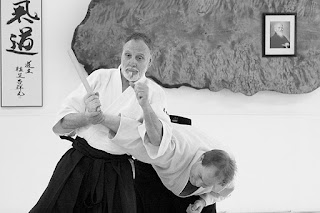Do You Really Want To Hurt Me . . .
Recently, a friend sent me a video recording of the seminar taught by the late Kenneth Cottier Sensei in 2003 in DC. I was so overjoyed. To begin with, it was one of the best Aikido seminar I have ever attended. I really would like to watch it again and to share it with our students. Second, I thought the footage had been long lost. It was such a delight to see the image of my teacher and hear his voice once again . . .
Cottier Sensei had sustained numerous injuries over his many years in Judo and then Aikido. The less severe ones left him with long term pain while some really serious ones damaged his body permanently. By the time Sensei came to visit us in DC, his swollen knees were hurting day and night. He could barely walk. It was hardly noticeable in the video, however, because he was as sharp and swift as ever. When we were hanging out at our house, Sensei showed me his many injuries like going over souvenirs in a display cabinet. The one that left Sensei with the most anguish and resentment seemed to be his elbows which would not straighten. They were the aftermath of the nikkyo from a famous Aikido instructor who was known for his "powerful techniques".
"Every injury on my body has to do with someone's ego." I remember Sensei said.
I started learning from Cottier Sensei rather early on. The basic Aikido ethics that Sensei taught me from day one is: Never sacrifice your partner for a throw.
A throw is only a throw. It is easy to become task-oriented and really want to see a throw happen. But what we seek in practice is inside us, not a fancy spectacle outside in the form of a throw or a pin. The satisfaction for the nage from a throw does not last, but the damage to the uke's body can be permanent. Bodies are fragile. Whether you mean it or not, you are still responsible. While it would be nice that you extend an apology to your partner after you make a mistake, what your partners can use more is your due care and self control so that such things do not happen. This way, you never have to apologize.
I look back at the many injuries that I have had over the years, except for the one time when my foot was accidentally trapped in a friend's hakama, just like Sensei said, pretty much every single incident had to do with ego.
One time, my nage missed my center while trying to do iriminage. As he was about to throw me, I slipped out of his arms from a sliver of an opening. If this were to happen in my class nowadays, I would suggest students to let it go, learn from it and do the next one better. Unfortunately, my partner would not have it. Just as our shoulders passed each other, he threw his right arm back to reach for me. We got into an almost back-to-back position, with his elbow wrapped around my neck. Given how much bigger he was, as he twisted his torso and threw his elbow forward, I rolled over his back, over-rotated and landed on my right knee. My entire leg instantly froze up. My knee would not bend. The pain was immense. I was lucky that nothing was broken, but I limped with a cane for months.
A student once asked, "To avoid rubbing a partner the wrong way and risk getting hurt, maybe I should just take a fall for them no matter what?"
Wouldn't it be nice if life were this simple?
Cottier Sensei had a muscle detached from his right shoulder. The floppy muscle sat on his right elbow when his arm was down. Sensei said it was the result of his trying to take ukemi for a student during a demo, even though the technique was not meant to happen. He did not blame the student for it. It was his own mistake, Sensei admitted. He should not have done such a move for the show.
Almost twenty years ago, I tried taking ukemi for a botched kokyunage by a friend. This older gentleman was suffering from movement problems, and was, thus, understandably frustrated. I thought I was doing him a favor by falling for him, even though his position was off and I was not really aligned to take a roll. What I ended up with was a hip injury that plagues me to this day.
Lesson learned: Be genuine and be sincere. Do what is there. What is meant to happen will happen. It is really not up to you to manufacture something out of nothing, even with the best intentions.



Comments
Post a Comment